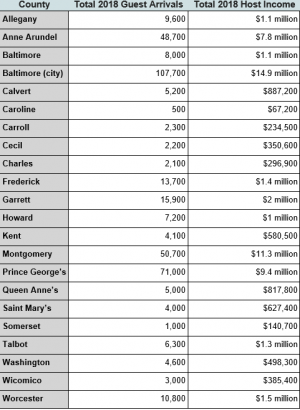
OCEAN CITY — While Ocean City officials continue to grapple with the short-term rental issue, at least one of the companies providing the service in the resort and across Maryland this week reported a banner year in 2018.
For well over a year, Ocean City has been monitoring the proliferation of short-term vacation rentals in the resort brokered by online platforms such as Airbnb and VRBO, for example. In fact, the short-term vacation rental issue was an agenda item on a tourism commission meeting on Thursday held too late to be included in this edition.
The concern in recent years has largely been on two fronts including the apparent lack of room tax collection on the one hand, and the sanctity of the neighborhoods in which short-term vacation rentals are located.
Airbnb, VRBO and similar Internet sites enable property owners to rent homes, apartments and even single rooms to visitors searching for accommodations by bypassing the traditional rental companies that carry larger commissions with each booking. Just as Uber has transformed the public transportation industry, Airbnb, VRBO and similar companies have rocked the traditional rental industry with millions of available vacation accommodations in thousands of cities across the U.S. including Ocean City.
While resort officials continue to debate the impact of online short-term vacation rentals, Airbnb this week released data on the company’s earnings in Maryland for 2018. Statewide, Airbnb hosts in Maryland earned roughly $57 million in supplemental income last year. Airbnb hosts in Maryland welcomed 383,600 guests in 2018, the company’s report summarized.
According to the report, there are currently over 6,500 Airbnb hosts in Maryland who share their residences with online vacation shoppers. The average amount of yearly supplemental income for the hosts comes in at around $5,600. In Worcester County, Airbnb hosts welcomed 10,800 visitors in 2018 and collected around $1.5 million in supplemental income.
While the report did not break down Worcester’s data by jurisdiction, the assumption is most of the Airbnb rentals in the county are located in and around the Ocean City area and the north end of the county. According to the Airbnb data, Worcester County ranked sixth in the state in total number of guests hosted in 2018 and also sixth in the amount of income collected by the hosts. Baltimore City was tops in the state with over 107,000 guest arrivals reported and nearly $15 million in income collected by hosts.
“2018 was another great year for Airbnb in Maryland with more local residents and small businesses able to benefit from the economic opportunities created by home-sharing then ever before,” said Airbnb spokesperson Liz DeBold Fusco this week. “As we reflect on this past year and celebrate the beginning of a new one, we are proud to have played a small role in countless memories and cultural exchanges statewide, from summer trips to the holiday season. We look forward to continuing to help families across Maryland earn extra income while allowing countless communities to enjoy the tourism economy in 2019.”
Whether the Ocean City community has benefited from the tourism economy touted by Airbnb has been the subject of considerable debate over the last year or so. The working assumption all along had been most of the short-term vacation property owners likely weren’t acquiring requisite business licenses and, therefore, were not likely remitting the required room tax. It is a serious concern in a resort town with thousands of hotel rooms and condos playing by the rules.
However, last year it was announced during a tourism committee meeting careful research conducted by town staff revealed the majority of the short-term rental listings in Ocean City were licensed. However, it was unclear of those short-term vacation rentals that were licensed were remitting the requisite room tax.
A survey of Airbnb listings in the Ocean City area for the upcoming weekend revealed over 300 short-term vacation rentals were available. The listings range from around $18 a night for a single room to as high as around $300 for an oceanfront, five-bedroom condo, but the majority were under $100 per night. It’s important to note those rates are for January and are much higher in the warm months.
The Airbnb data for Maryland and Worcester County released this week essentially confirms the online short-term rental business is thriving. Resort officials continue to try to come to grips on how best to monitor and regulate, if necessary, the growing business locally. During last year’s General Assembly session, there were at least two bills filed that would have added regulations to the short-term rental industry, but neither passed. On the eve of another General Assembly session, there will likely be new legislation introduced aimed at the industry.
On the local front, resort officials continue to monitor the issue and conduct its own research on which ones are obtaining the required business licenses and which are remitting the requisite room tax. In short, there are short-term rentals that are acquiring the business license and remitting room tax and there are likely some licensed short-term rentals that are not remitting room tax. There are also short-term rentals that are not licensed, but may be remitting room tax, and finally there are likely some that neither acquire the business license nor remit room tax.

